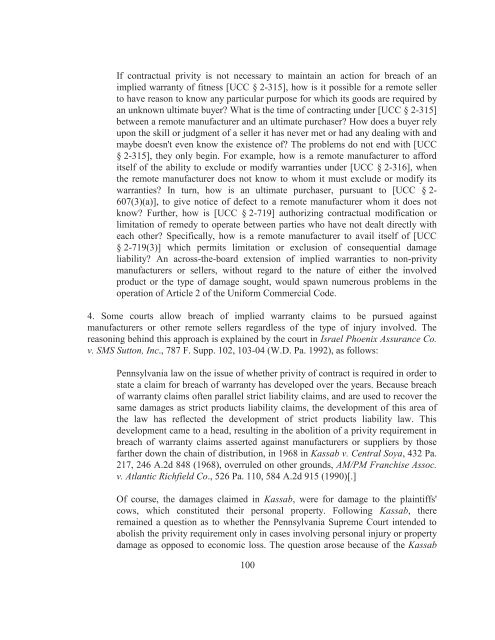Sales and Leases - A Problem-based Approach, 2016a
Sales and Leases - A Problem-based Approach, 2016a
Sales and Leases - A Problem-based Approach, 2016a
Create successful ePaper yourself
Turn your PDF publications into a flip-book with our unique Google optimized e-Paper software.
If contractual privity is not necessary to maintain an action for breach of an<br />
implied warranty of fitness [UCC § 2-315], how is it possible for a remote seller<br />
to have reason to know any particular purpose for which its goods are required by<br />
an unknown ultimate buyer? What is the time of contracting under [UCC § 2-315]<br />
between a remote manufacturer <strong>and</strong> an ultimate purchaser? How does a buyer rely<br />
upon the skill or judgment of a seller it has never met or had any dealing with <strong>and</strong><br />
maybe doesn't even know the existence of? The problems do not end with [UCC<br />
§ 2-315], they only begin. For example, how is a remote manufacturer to afford<br />
itself of the ability to exclude or modify warranties under [UCC § 2-316], when<br />
the remote manufacturer does not know to whom it must exclude or modify its<br />
warranties? In turn, how is an ultimate purchaser, pursuant to [UCC § 2-<br />
607(3)(a)], to give notice of defect to a remote manufacturer whom it does not<br />
know? Further, how is [UCC § 2-719] authorizing contractual modification or<br />
limitation of remedy to operate between parties who have not dealt directly with<br />
each other? Specifically, how is a remote manufacturer to avail itself of [UCC<br />
§ 2-719(3)] which permits limitation or exclusion of consequential damage<br />
liability? An across-the-board extension of implied warranties to non-privity<br />
manufacturers or sellers, without regard to the nature of either the involved<br />
product or the type of damage sought, would spawn numerous problems in the<br />
operation of Article 2 of the Uniform Commercial Code.<br />
4. Some courts allow breach of implied warranty claims to be pursued against<br />
manufacturers or other remote sellers regardless of the type of injury involved. The<br />
reasoning behind this approach is explained by the court in Israel Phoenix Assurance Co.<br />
v. SMS Sutton, Inc., 787 F. Supp. 102, 103-04 (W.D. Pa. 1992), as follows:<br />
Pennsylvania law on the issue of whether privity of contract is required in order to<br />
state a claim for breach of warranty has developed over the years. Because breach<br />
of warranty claims often parallel strict liability claims, <strong>and</strong> are used to recover the<br />
same damages as strict products liability claims, the development of this area of<br />
the law has reflected the development of strict products liability law. This<br />
development came to a head, resulting in the abolition of a privity requirement in<br />
breach of warranty claims asserted against manufacturers or suppliers by those<br />
farther down the chain of distribution, in 1968 in Kassab v. Central Soya, 432 Pa.<br />
217, 246 A.2d 848 (1968), overruled on other grounds, AM/PM Franchise Assoc.<br />
v. Atlantic Richfield Co., 526 Pa. 110, 584 A.2d 915 (1990)[.]<br />
Of course, the damages claimed in Kassab, were for damage to the plaintiffs'<br />
cows, which constituted their personal property. Following Kassab, there<br />
remained a question as to whether the Pennsylvania Supreme Court intended to<br />
abolish the privity requirement only in cases involving personal injury or property<br />
damage as opposed to economic loss. The question arose because of the Kassab<br />
100


















